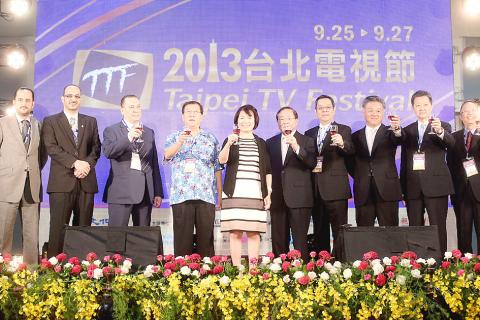Minister of Culture Lung Ying-tai (龍應台) yesterday expressed regret over the withdrawal of several Chinese TV stations from this year’s Taipei TV Festival, allegedly due to China’s discontent with the participation of a TV station associated with the Falun Gong spiritual movement.
“The political divergence [between the two sides of the Taiwan Strait] has made the exchange of broadcast content the most profound [cross-strait] cultural exchange we can have. The TV festival is a channel through which we can climb over that political fence,” Lung said.
Lung said the Chinese TV stations had “lost the forest for the trees” by withdrawing from the festival for political reasons, adding that while she understood there might be “certain rules” that those stations had to comply with, she hoped they could join next year’s festival.

Photo: CNA
Now in its 10th year, the festival — which opened yesterday and runs through tomorrow — has attracted 95 broadcasting and production companies from more than 14 countries, including the UK, the US, Japan, Singapore, Hong Kong, Turkey, Greece, Vietnam and the Netherlands, to showcase their programs.
In previous years, about one-third of the exhibitors came from China, including some affiliated with the Chinese government. However, a Chinese delegation comprising of just over 100 representatives is attending this year.
According to a source familiar with the matter who spoke to the Liberty Times (the Taipei Times’ sister newspaper), the Chinese stations’ withdrawal was in response to an order from China’s Taiwan Affairs Office and State Administration of Radio Film and Television to avoid direct contact with representatives of New Tang Dynasty Television (NTDTV).
NTDTV was founded in the US in 2001 by several Chinese expatriates and Falun Gong practitioners with the aim of providing uncensored information to Chinese citizens and others and facilitating press freedom in China.
NTDTV had participated in the festival for the past few years, the source said, adding that the Chinese probably decided to boycott this year’s festival because of the change of venue.
“The festival had traditionally been held in the Grand Hotel, where participants were allowed to set up their exhibition stands in their respective rooms. However, this year the event has been moved to the Taipei World Trade Center Hall 3, an open-style exhibition hall,” the source said.
Lin Tung-cheng (林銅城), chief executive officer of festival organizer Hochan Entertainment Co confirmed the reports yesterday, but added that the boycott was motivated solely by NTDTV’s participation, not the change of venue.
NTDTV spokesperson Chu Wan-chi (朱婉琪) said the station was established to inform ethnic Chinese of the truth about China and that it neither encouraged nor opposed Chinese media joining the festival.

Taiwanese can file complaints with the Tourism Administration to report travel agencies if their activities caused termination of a person’s citizenship, Mainland Affairs Council Minister Chiu Chui-cheng (邱垂正) said yesterday, after a podcaster highlighted a case in which a person’s citizenship was canceled for receiving a single-use Chinese passport to enter Russia. The council is aware of incidents in which people who signed up through Chinese travel agencies for tours of Russia were told they could obtain Russian visas and fast-track border clearance, Chiu told reporters on the sidelines of an event in Taipei. However, the travel agencies actually applied

Japanese footwear brand Onitsuka Tiger today issued a public apology and said it has suspended an employee amid allegations that the staff member discriminated against a Vietnamese customer at its Taipei 101 store. Posting on the social media platform Threads yesterday, a user said that an employee at the store said that “those shoes are very expensive” when her friend, who is a migrant worker from Vietnam, asked for assistance. The employee then ignored her until she asked again, to which she replied: "We don't have a size 37." The post had amassed nearly 26,000 likes and 916 comments as of this

New measures aimed at making Taiwan more attractive to foreign professionals came into effect this month, the National Development Council said yesterday. Among the changes, international students at Taiwanese universities would be able to work in Taiwan without a work permit in the two years after they graduate, explainer materials provided by the council said. In addition, foreign nationals who graduated from one of the world’s top 200 universities within the past five years can also apply for a two-year open work permit. Previously, those graduates would have needed to apply for a work permit using point-based criteria or have a Taiwanese company

The Shilin District Prosecutors’ Office yesterday indicted two Taiwanese and issued a wanted notice for Pete Liu (劉作虎), founder of Shenzhen-based smartphone manufacturer OnePlus Technology Co (萬普拉斯科技), for allegedly contravening the Act Governing Relations Between the People of the Taiwan Area and the Mainland Area (臺灣地區與大陸地區人民關係條例) by poaching 70 engineers in Taiwan. Liu allegedly traveled to Taiwan at the end of 2014 and met with a Taiwanese man surnamed Lin (林) to discuss establishing a mobile software research and development (R&D) team in Taiwan, prosecutors said. Without approval from the government, Lin, following Liu’s instructions, recruited more than 70 software